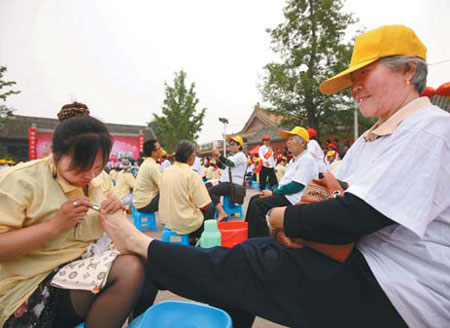Guardianship amendment considered to protect the elderly
|
A woman helps her mother cut and clean her toenails. To show the respect to mothers, about 100 people took part in an activity called "washing mother's feet", which was launched by the Mengcheng county government, in Anhui province, on May 12, the day before Mother's Day. Hu Weiguo / for China Daily |
Chinese legislators are mulling over introducing elderly guardianship in the latest amendment to the law on senior citizens' rights, given the risk of cognitive disability to the country's rapidly expanding older population.
A senior citizen capable of exercising his or her civil rights, can choose a guardian and a monitor of the guardian among close relatives, individuals and organizations willing to shoulder the responsibilities, according to a draft amendment to the Law on Protection of Rights and Interests of the Aged.
The draft was submitted to the National People's Congress Standing Committee for discussion on Tuesday.
The court can appoint a legal guardian for an elderly person who has partially or completely lost the capacity to exercise their civil rights, the draft stipulated.
A legal guardian should protect the interests of the ward once he or she cannot fully exercise their civil rights; otherwise, the monitor can request that the relevant government departments handle the situation or file a suit against the guardian.
"We set up the guardianship system to protect the personal and financial rights of older people who are physically or mentally incompetent," said Zhang Xuezhong, vice-chairman of the Internal and Judicial Affairs Committee of the NPC, who gave a speech about the draft law on Tuesday.
According to the Ministry of Civil Affairs, there were about 33 million elderly people with varying forms of disability by the end of 2010. However, there are no official statistics about the number of senior citizens who are mentally incompetent.
Fang Jiake, deputy director of Hetong Senior Citizens' Welfare Association, an NGO in Tianjin, said he feels guardianship is helpful for people who cannot think clearly or make decisions about healthcare, financial arrangements or other aspects of life.
However, Fang stressed that even a rule designed to be protective can result in harm rather than help for the aged.
"I have heard about cases in rural areas where some distant relative of a childless elderly person was appointed legal guardian, but never visited or took care of the old person. When the local nursing home eventually informed him or her that the person had passed away, the guardian asked for a large sum of money as compensation their loss," he said.
Tu Xiaoju, a legal aid lawyer in Beijing's Changping district, said the courts require clearer instruction about how to appoint legal guardians.
"The process to determine whether an old person needs a guardian and who should act as guardian can be prolonged and may end up making everyone involved unhappy, particularly when the elderly person's family members disagree with each other," she said.
Compared with the previous law, the draft articulates for the first time that people should take care of the psychological needs of their elderly parents.
It said offspring should visit often or send regards to their elderly parents regularly, if they live separately.
It also mentioned that employers should guarantee that their employees can take home leave.
Xu Weijiang, director of Dongcheng district office of the committee on ageing in Beijing, welcomed the move.
"We have millions of workers who left their hometown and came to work in big cities such as Beijing, and a large number of these people are the only child in their families. You can imagine the loneliness of their parents," Xu said.
"Currently, married employees can only take home leave once every four years if their parents live in a different city. That's too little time for a family reunion. I hope the legislation can allow people to take home leave at least once every year," he said.
The government should consider deducting young people's personal income tax as an incentive for the family support of old age, said Yao Jingyuan, a researcher with the Councillor's Office of the State Council, during an online interview with China News.
The financial burden for a young couple to take care of their elderly family members is increasingly heavy, he said, because they have to maintain four parents and even eight grandparents as a result of the family planning policy implemented in China for about three decades, he said.
hedan@chinadaily.com.cn



















